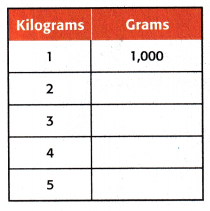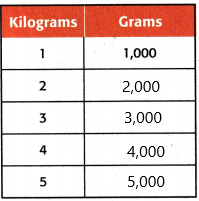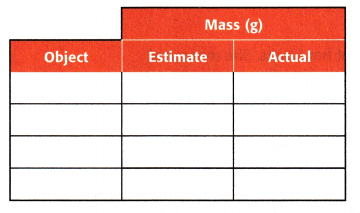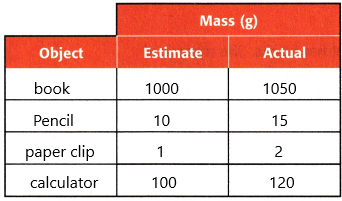All the solutions provided in McGraw Hill My Math Grade 5 Answer Key PDF Chapter 11 Lesson 11 Estimate and Measure Metric Mass will give you a clear idea of the concepts.
McGraw-Hill My Math Grade 5 Answer Key Chapter 11 Lesson 11 Estimate and Measure Metric Mass
The mass of an object is the amount of matter it has. A gram is a metric unit of measurement of mass.
Measure It
1. Estimate the mass of each object in grams. Record your results in the table.

2. Measure the mass of each object.
Place the scissors on one side of a balance. Set gram weights on the other side until the sides are level. Record the actual mass. Repeat this step for the other objects.

Answer:
Estimate the answers:
Here only sample answers are given:

Try It
A kilogram is also a metric unit of measurement of mass. One kilogram is equal to 1,000 grams. Use this to complete the table below.

Look for a pattern in the table.
How many grams are in 6 kilograms? _________________
How many grams are in 9 kilograms? _________________
Answer:
1 kilogram (kg) is equal to 1000 grams (g).
1 kg = 1000 grams
The mass m in grams (g) is equal to the mass m in kilograms (kg) times 1000:
m(g) = m(kg) x 1000
m(g) = 2 x 1000 = 2000
m(g) = 3 x 1000 = 3000
m(g) = 4 x 1000 = 4000
m(g) = 5 x 1000 = 5000
m(g) = 6 x 1000 = 6000
m(g) = 9 x 1000 = 9000

Talk About It
Question 1.
Order the four objects you weighed in the first activity from greatest to least mass.
Answer:
There are four objects given in the above example.
scissors, pencil, stapler, calculator.
The greatest mass is a stapler, calculator, scissors and then a pencil.
The least mass is having the pencil.
Question 2.
Mathematical PRACTICE Explain to a Friend Use the mass of the objects you found to estimate the mass of two other objects in your classroom. Then find the mass of the objects. Were your estimates close?
Answer:
Yes, my estimates were close. I was able to find the mass of the objects and they were within the range that I estimated.
Question 3.
Could a larger object have less mass than a smaller object? Explain.
Answer:
A larger object could have less mass than a smaller object depending on what the object is made of.
For example, if we take a pillow and a brick, but a brick has a greater mass. The pillow is less mass.
Question 4.
Explain how you can use mental math in order to convert kilograms to grams.
Answer:
convert kilograms to grams:
1 kilogram (kg) is equal to 1000 grams (g).
1 kg = 1000 grams
The mass m in grams (g) is equal to the mass m in kilograms (kg) times 1000:
m(g) = m(kg) x 1000
convert grams to kilograms:
1 gram (g) is equal to 0.001 kilograms (kg).
1 g = 1 / 1000 = 0.001 kg
The mass m in kilograms (kg) is equal to the mass m in grams (g) divided by 1000:
m(kg) = m(g) / 1000
Practice it
Question 5.
Identify three objects in your classroom that you can use the balance to find their masses. Estimate each object’s mass. Then find the mass of each object and record the exact mass in the table.

Answer:
Three objects in my classroom that I can use the balance to find their masses are a book, a pencil, and a paper clip. I estimate that the book has a mass of 1 kilogram, the pencil has a mass of 10 grams, the paper clip has a mass of 1 gram and the calculator has a mass of 100 grams.
Sample answers are given.

Compare. Use >, <, or = to make a true statement.
Question 6.
1,500 grams ![]() 1 kilogram
1 kilogram
Answer: greater than (>)
Explanation:
convert grams to kilograms:
1 gram (g) is equal to 0.001 kilograms (kg).
1 g = 1 / 1000 = 0.001 kg
The mass m in kilograms (kg) is equal to the mass m in grams (g) divided by 1000:
m(kg) = m(g) / 1000
m(kg) = 1500 / 1000
m(kg) = 1.5
1500 grams is larger than 1 kilogram because of 1 kilo=1000 grams so that’s 500 more than 1 kilo.
Question 7.
3,000 grams ![]() 3 kilograms
3 kilograms
Answer: equal to (=)
Explanation:
convert grams to kilograms:
1 gram (g) is equal to 0.001 kilograms (kg).
1 g = 1 / 1000 = 0.001 kg
The mass m in kilograms (kg) is equal to the mass m in grams (g) divided by 1000:
m(kg) = m(g) / 1000
m(kg) = 3000 / 1000
m(kg) = 3
Therefore, 3000 grams is equal to 3 kilograms.
Question 8.
4,000 grams ![]() 3 kilograms
3 kilograms
Answer: greater than (>)
Explanation:
convert grams to kilograms:
1 gram (g) is equal to 0.001 kilograms (kg).
1 g = 1 / 1000 = 0.001 kg
The mass m in kilograms (kg) is equal to the mass m in grams (g) divided by 1000:
m(kg) = m(g) / 1000
m(kg) = 4000 / 1000
m(kg) = 4
4 kilograms is greater than 3 kilograms.
Therefore, 4000 grams is greater than 3 kilograms.
Question 9.
3,700 grams ![]() 4 kilograms
4 kilograms
Answer: less than (<)
Explanation:
convert grams to kilograms:
1 gram (g) is equal to 0.001 kilograms (kg).
1 g = 1 / 1000 = 0.001 kg
The mass m in kilograms (kg) is equal to the mass m in grams (g) divided by 1000:
m(kg) = m(g) / 1000
m(kg) = 3700 / 1000
m(kg) = 3.7
3.7 kg is less than 4 kilograms
Therefore, 3700 grams is less than 4 kg.
Question 10.
5 kilograms ![]() 6,000 grams
6,000 grams
Answer: less than (<)
Explanation:
convert kilograms to grams:
1 kilogram (kg) is equal to 1000 grams (g).
1 kg = 1000 grams
The mass m in grams (g) is equal to the mass m in kilograms (kg) times 1000:
m(g) = m(kg) x 1000
m(g) = 5 x 1000
m(g) = 5000
5000 grams is less than 6000 grams.
Therefore, 5 kilograms is less than 6000 grams.
Question 11.
3.5 kilograms ![]() 3,000 grams
3,000 grams
Answer: greater than (>)
convert kilograms to grams:
1 kilogram (kg) is equal to 1000 grams (g).
1 kg = 1000 grams
The mass m in grams (g) is equal to the mass m in kilograms (kg) times 1000:
m(g) = m(kg) x 1000
m(g) = 3.5 x 1000
m(g) = 3500
3500 is greater than 3000 grams
Therefore, 3.5 kilograms is greater than 3000 grams.
Question 12.
2.5 kilograms ![]() 2,500 grams
2,500 grams
Answer: equal to (=)
Explanation:
convert kilograms to grams:
1 kilogram (kg) is equal to 1000 grams (g).
1 kg = 1000 grams
The mass m in grams (g) is equal to the mass m in kilograms (kg) times 1000:
m(g) = m(kg) x 1000
m(g) = 2.5 x 1000
m(g) = 2500
2500 grams is equal to 2500 grams
Therefore, 2.5 kg is equal to 2500 grams.
Question 13.
3.25 kilograms ![]() 3,300 grams
3,300 grams
Answer: less than (<)
Explanation:
convert kilograms to grams:
1 kilogram (kg) is equal to 1000 grams (g).
1 kg = 1000 grams
The mass m in grams (g) is equal to the mass m in kilograms (kg) times 1000:
m(g) = m(kg) x 1000
m(g) = 3.25 x 1000
m(g) = 3250
3250 is less than 3300
Therefore, 3.25 kg is less than 3300 grams.
Apply It
Question 14.
Randy and Salma measured the mass of the same chinchilla. Randy measured the chinchilla as 1 kilogram. Salma measured the chinchilla as 945 grams. Circle the more precise measurement.
945 grams
1 kilogram
Answer:
The above-given:
The amount of chinchilla measured by Randy = 1 kg
The amount of chinchilla measured by Salma = 945 grams
Here asked which one is more precise.
definitely 945 grams is more precise.

Precision refers to the amount of information that is conveyed by a number in terms of its digits; it shows the closeness of two or more measurements to each other. It is independent of accuracy.
Question 15.
Edita measured the mass of her books. She measured the mass as 2 kilograms. Her second measurement was 2,050 grams. Use >, <, or = to make a true statement.
2 kilograms ![]() 2,500 grams
2,500 grams
Answer: less than (<)
Explanation:
convert kilograms to grams:
1 kilogram (kg) is equal to 1000 grams (g).
1 kg = 1000 grams
The mass m in grams (g) is equal to the mass m in kilograms (kg) times 1000:
m(g) = m(kg) x 1000
m(g) = 2 x 1000
m(g) = 2000
2000 is less than 2500
Therefore, 2 kg is less than 2500 grams.
Question 16.
Mathematical PRACTICE Be Precise If you are measuring the mass of a container of salt, would grams or kilograms give you a more precise measurement? Explain.

Answer:
That depends on what kind of unit is more precise. The kilogram, for example, is a fundamental unit of mass used in many scientific applications. But here grams will be the more precise according to the grams of the container we can convert it into kilograms.
Question 17.
Mathematical PRACTICE Draw a Conclusion Compare and contrast grams and kilograms.
Answer:
The kilogram is the only SI unit that was directly defined based on an artefact as opposed to physical properties. 1kilogram equals 1000g. A gram is a metric system used to refer to mass. On the other hand, a kilogram is the base unit of mass in the International System of Units. The gram symbol is g while the kilogram symbol is kg. Grams are mainly used to measure items which are less than 1kg. Kilograms, on the other hand, are used to measure heavier items.
Write About It
Question 18.
How can I convert grams to kilograms without measuring?
Answer:
To convert Grams to Kilograms, multiply the Mass by the conversion ratio. One Grams is equal to 0.001 Kilograms, so use this simple formula to convert: Grams = Kilograms × 0.001
McGraw Hill My Math Grade 5 Chapter 11 Lesson 11 My Homework Answer Key
Practice
Compare. Use >, <, or = to make a true statement.
Question 1.
2,300 grams ![]() 2 kilograms
2 kilograms
Answer: greater than (>)
Explanation:
convert grams to kilograms:
1 gram (g) is equal to 0.001 kilograms (kg).
1 g = 1 / 1000 = 0.001 kg
The mass m in kilograms (kg) is equal to the mass m in grams (g) divided by 1000:
m(kg) = m(g) / 1000
m(kg) = 2300 / 1000
m(kg) = 2.3
2.3 kg is greater than 2 kg
Therefore, 2300 grams is greater than 2 kg.
Question 2.
4,840 grams ![]() 5 kilograms
5 kilograms
Answer: less than (<)
Explanation:
convert grams to kilograms:
1 gram (g) is equal to 0.001 kilograms (kg).
1 g = 1 / 1000 = 0.001 kg
The mass m in kilograms (kg) is equal to the mass m in grams (g) divided by 1000:
m(kg) = m(g) / 1000
m(kg) = 4840 / 1000
m(kg) = 4.84
4.84 kg is less than 5 kg
Therefore, 4840 grams is less than 5 kilograms.
Question 3.
4 kilograms ![]() 4,150 grams
4,150 grams
Answer: less than (<)
Explanation:
convert kilograms to grams:
1 kilogram (kg) is equal to 1000 grams (g).
1 kg = 1000 grams
The mass m in grams (g) is equal to the mass m in kilograms (kg) times 1000:
m(g) = m(kg) x 1000
m(g) = 4 x 1000
m(g) = 4000
4000 is less than 4150
Therefore, 4 kg is less than 4150 grams.
Question 4.
1.75 kilograms ![]() 1,750 grams
1,750 grams
Answer: equal to (=)
explanation:
convert kilograms to grams:
1 kilogram (kg) is equal to 1000 grams (g).
1 kg = 1000 grams
The mass m in grams (g) is equal to the mass m in kilograms (kg) times 1000:
m(g) = m(kg) x 1000
m(g) = 1.75 x 1000
m(g) = 1750
1750 is equal to 1750
Therefore, 1.75 kg is equal to 1750 grams.
Vocabulary Check
Question 5.
Fill in the blank with the correct word to complete the sentence below.
The _________________ of an object is the amount of matter it has.
Answer: mass
The amount of matter in an object is referred to as its mass. Although the mass of an object is one of the factors that determine its weight, it is a different property. The amount of an object’s mass contained within the physical space it occupies, which is its volume, determines its density.
Problem Solving
Question 6.
Jason and Scott measured the masses of their cell phones. Jason measured his cell phone using kilograms. Scott measured his cell phone using grams. Which measure would be more appropriate to measure a cell phone?
Answer:
Grams and kilograms are relatively familiar measurements of weight.
Grams are a relatively small unit of measurement. One gram is about the weight of a single large paperclip. This means that grams are only used to measure small amounts of things.
Here I think grams would be more precise to measure the mobile.
Question 7.
Mathematical PRACTICE Be Precise Gavin has a ten-year-old cat, Shadow. Is Shadow’s mass more likely to be 6 kilograms or 6 grams? Explain.
Answer: 6 kilograms
Kilograms are a useful, accurate way to measure larger items. Doctors often used kilograms to measure how much a person weighs, and veterinarians or animal keepers often use kilograms to measure animal weights. Using kilograms can help both doctors and veterinarians ensure that their patients are growing correctly and are at a healthy weight.
Hence, cat Shadow’s mass is measured in kilograms.
Question 8.
Norton measured the mass of his luggage. His luggage mass was 21,530 grams. The airline will only allow luggage that has a mass under 23 kilograms. Will Norton be allowed to fly with his luggage? Explain.
Answer: Yes, Norton is allowed to fly with his luggage.
Explanation:
The above-given grams: 21,530
The given kilograms: 23
Explanation:
convert grams to kilograms:
1 gram (g) is equal to 0.001 kilograms (kg).
1 g = 1 / 1000 = 0.001 kg
The mass m in kilograms (kg) is equal to the mass m in grams (g) divided by 1000:
m(kg) = m(g) / 1000
m(kg) = 21530 / 1000
m(kg) = 21.53
21.53 kg is less than 23 kg
up to 23 kgs are allowed so undoubtedly, Norton is allowed to fly with his luggage.
Question 9.
Chasity measured the mass of her new puppy. Her first measurement was 2,350 grams. Her second measurement was 2.3 kilograms. Circle the measurement that is more precise.
2,350 grams
2.3 kilograms
Answer:
I would think 2.3 kilograms are more precise.

Precision refers to the amount of information that is conveyed by a number in terms of its digits; it shows the closeness of two or more measurements to each other. It is independent of accuracy.
Question 10.
Billy measured the mass of his iguana. His first measurement was 4,100 grams. His second measurement was 4 kilograms. Compare the two measurements. Use >, <, or = to make a true statement.

Answer: greater than (>)
The above-given measurements:
4100 grams and 4 kg
Explanation:
convert grams to kilograms:
1 gram (g) is equal to 0.001 kilograms (kg).
1 g = 1 / 1000 = 0.001 kg
The mass m in kilograms (kg) is equal to the mass m in grams (g) divided by 1000:
m(kg) = m(g) / 1000
m(kg) = 4100 / 1000
m(kg) = 4.1
4.1 kg is greater than 4 kg
Therefore, 4100 grams is greater than 4 kilograms.